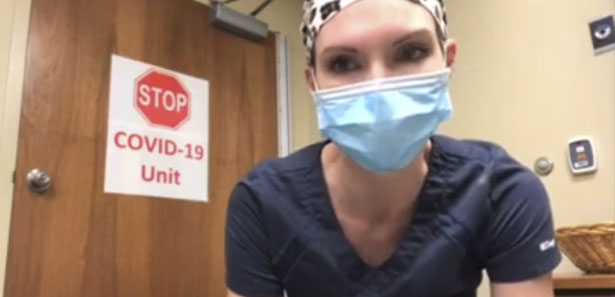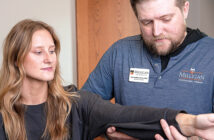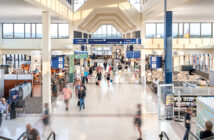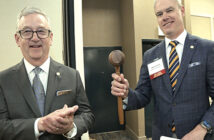Ballad Health COVID response leaders, fearing the continued dramatic rise in COVID cases will strain the health system’s capacity to the breaking point, Wednesday announced several actions designed to ready Ballad for what Chairman and CEO Alan Levine called, “what we believe could be the worst-case scenario.”
Among the actions:
• Ballad has obtained a second refrigerated truck to serve as overflow morgue space. The first is stationed at Johnson City Medical Center. The second will be at Holston Valley in Kingsport.
• The system will cease performing all non-emergent elective surgical procedures, including those that had already been scheduled, effective Dec. 7, for at least 30 days.
• The system will work with the states of Tennessee and Virginia to allow Ballad to utilize lower-licensed staff to do certain support functions that previously only nurses could do, in order to free up more nurses to work with additional patients if needed.
“The rapid increase we saw over the weekend with the number of cases, both tested and in the hospital – those don’t even include the Thanksgiving numbers – make us obviously very concerned about the capacity issues, and we’ve got to be proactive,” Levine told media at a Kingsport press conference. ““Our numbers at our hospitals are at all-time highs, and based on our modeling, which unfortunately has proven to be very accurate, we anticipate that we could see volumes as high as 550 by the end of December.” The system as currently configured has capacity for around 460.
Jamie Swift, chief infection prevention officer for Ballad Health, said, “Our current patient occupancy is at 93.6 percent of med-surg beds and 92 percent of ICU beds for the health system.”
Northeast Tennessee and Southwest Virginia together make up one of the nation’s hottest spots for COVID-19. Of the 723 people in the region who have died from COVID, 53 died in the last seven days.
Eric Deaton, COO of Ballad Health said, “The spread of COVID-19 is not under control in our area. The direction we’re heading with our numbers is not sustainable.”
“We have some of the highest percentages of positive tests in the country. If you look at us compared to other places…we have more than twice the percentage of positives that Virginia has. We’re higher than the rest of the state of Tennessee. We have enormous community spread happening here all the time.”
And while only one to two percent of the total number of people who test positive for COVID die, about 17 percent of the patients who are admitted to the hospital die from COVID-19. “Around one in six people that are admitted are dying right now,” said Deaton, who added that he expects that figure to rise.
The How
Regarding the morgue trucks, Levine said, “That’s an unsightly thing for people to see and it’s a very uncomfortable thing to talk about, but the reality is there’s not enough capacity for what we anticipate we will need. So, we needed to get some additional capacity for storage of bodies.”
The deferral of non-emergent elective surgeries is a price everyone involved will pay, Levine said. “Those deferrals of procedures come at a great cost. They come at a cost to the patients who were expecting to have procedures done that they need. They come at a cost to the system. Obviously, it’s a sacrifice for team members who are going to be redeployed.”
Those redeployments will likely necessitate the closure of some clinics, Levine said. And while no furloughs are anticipated, all employees who are reassigned to handle additional COVID-related duties will be expected to, “support us in that role,” Levine said.
The Why
Why is this region faring so much worse than most of the rest of the country in battling COVID? People avoid catching the virus by modeling certain behaviors, such as wearing masks, socially distancing while in public and staying at home as much as possible. The people of this region have fallen prey to misinformation which has led them to eschew such healthy behaviors, Levine said. “There’s nothing more important that information and there’s nothing more damaging than misinformation.”
“There are (doctors and nurses) by that bedside holding the hands of people who are dying, many of whom didn’t even believe us when we told them they had COVID. And that’s because of so much misinformation.”
Levine blamed electioneering for some of the misinformation being spread. “It has been very hurtful to our team members, to our nurses, to our doctors, to hear people – even elected people in Washington – say that hospitals and doctors are incentivized to diagnose people with COVID. That’s just not true. That’s one of the most cynical, unproductive things I have ever heard in my 30-year career. I think it’s irresponsible to say things like that.”
Levine said hospitals would far prefer to not have to deal with COVID at all, adding, “If we wanted to admit people with COVID, we wouldn’t be sitting here telling you, ‘please wear a mask and socially distance’ and begging you not to go to these large events.”
“We don’t want this to happen,” Levine said. “We don’t want our nurses to have to put patients in body bags who shouldn’t have had to go into body bags.”
Levine also asked for the general public to voice their support for medical professionals throughout the region. It is exhausting to work extra shifts to deal with the added patient volume, he said, but it is doubly disheartening for medical staff when their patients tell them the disease they are fighting is “fake news.”
“They hear from the people who don’t believe them,” Levine said. “I think it would be good for the nurses to hear from the people who do believe them.”
The Vaccine
The vaccine has long been the burning beacon on the distant horizon, and that beacon is fast becoming the light at the end of the tunnel. Levine called it a miracle, and said Ballad will follow CDC and state guidelines in its distribution as soon as Ballad receives its first shipments. The system already has freezers in place in Abingdon, Bristol, Johnson City and Kingsport to house the invaluable material.
Still, Levine said, expectations should be held to realistic levels. “We don’t want the public to believe you get one shot and it’s all over. We’ve got months left of this.”
The vaccine will require two shots per patient, with about a month between shots, and then a few more weeks will pass before the patient reaches immunity. That means even if the first vaccine recipients receive their first doses before the end of the year, the 85 to 95 percent who achieve immunity will not do so before sometime around March.
“We’re hopeful the vaccine will help us find our way out of this, but the grim reality is that for the next two months,” Levine said, “we’re facing what the data shows is going to be a pretty significant challenge.”
And, that means the region has a choice to make: take the virus at least as seriously as the rest of the nation is, or watch those refrigerated morgue trucks fill at an increasing rate for the next several months.
“We can’t make people (wear masks and socially distance), but we can share the consequences of not doing it,” Levine said. “Again, 723 people are dead from COVID in this region through early this morning, and I suspect that number will go up again today.”
Concluded Deaton, “It’s time for us to start really waking up as a community to see what we can do to stop the spread.”




